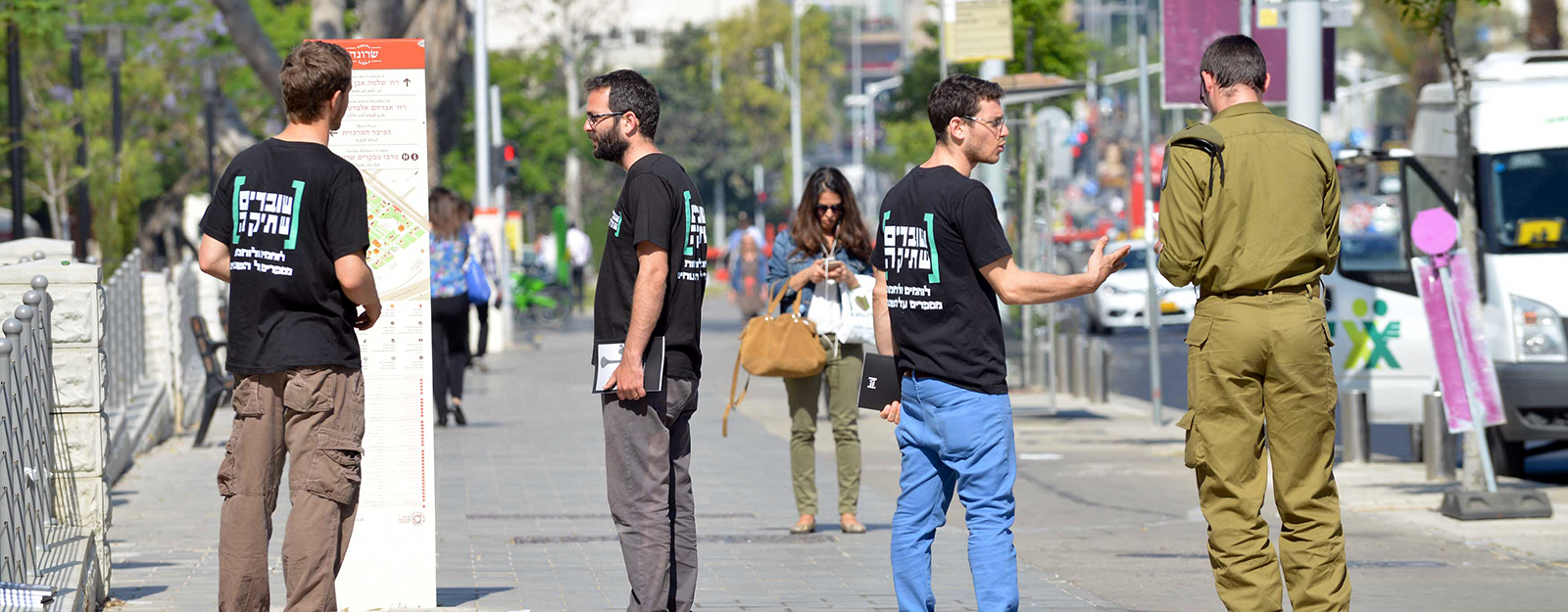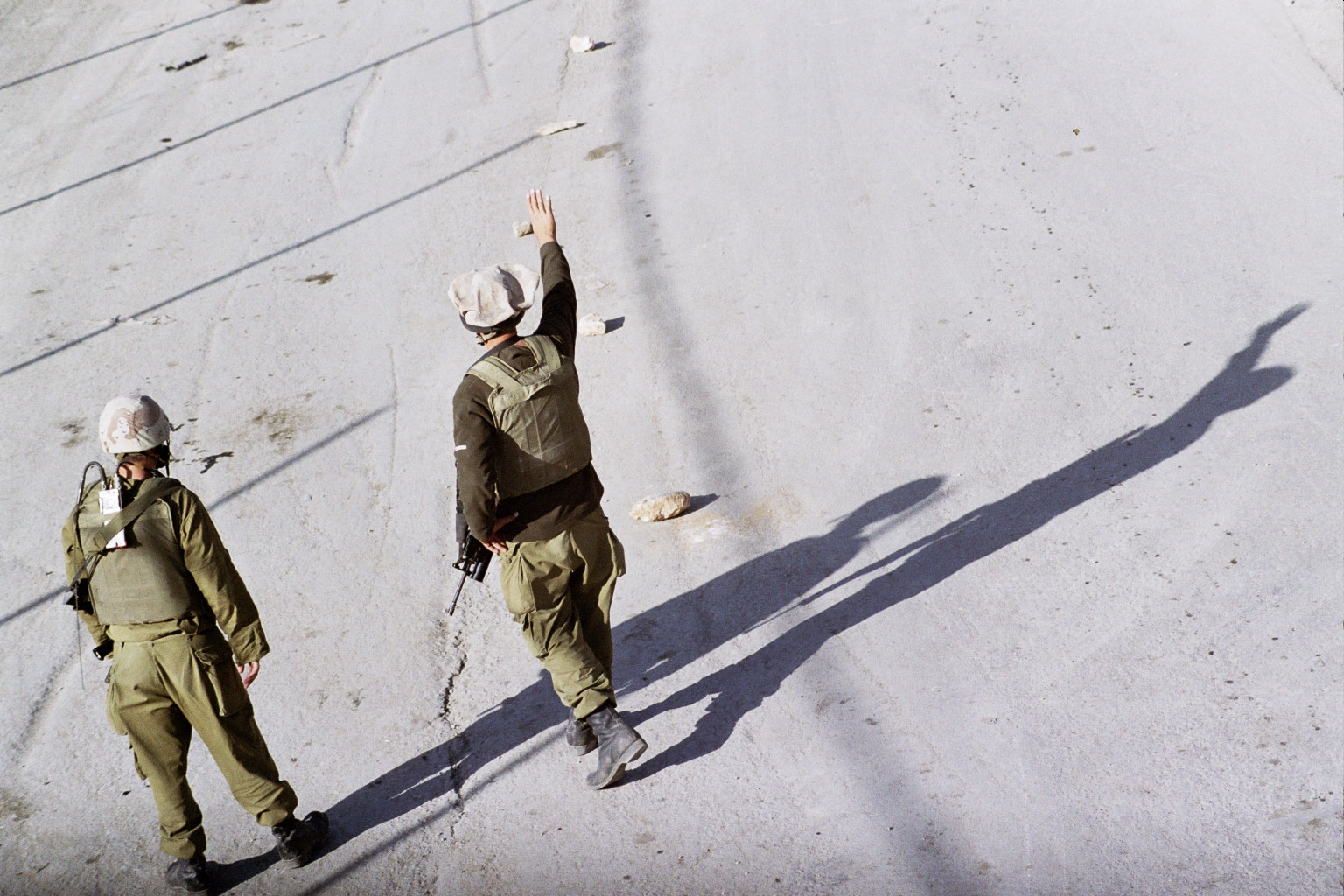What about ‘straw widows’ (temporary commandeering of houses)? I can only tell you about the ones I did.
Throughout the area or only along the routes? No, sometimes it’s even inside the village. Here there really is an element of preventing terrorist activity, unlike mappings. You’re defending. You enter a house in the middle of the night, you take the family, the head of the family, try to explain to him in Hebrew. Usually we also bring with us someone who speaks Arabic. You put him and the family into a room, give them food, coffee, whatever they want. You tell the father that whenever he wants, he can knock on the door and we’ll open it and get him whatever he needs. Mostly we also tried to put them in a room with a TV. It’s the right thing and it’s also good from an operational point of view, because when the TV is on, there’s no suspicion aroused that something special is going on inside the house. And we go in for the night and look out on the street.
What happens if a guest arrives? If a guest arrives, we open the door, we allow him inside. We let him in.
Were there cases [like that]? Yes, it happened. The father came, the mother came, because after a while that the guy didn’t show up somewhere, the father went looking for him. So the father came and this and that came, and it ended up being a family get-together. It’s a bit scary for the Palestinians, but there were no cases of…
How many people were in the room on average, when guests came along? I don’t know, I think seven or eight people in the room. I don’t recall holding them in inhuman conditions, and even if we did, the instructions were always to put the family in as comfortable a setting as possible, and to leave someone guarding them so they won’t come out.
Cell phones? We take their cell phones, obviously, we put them away and give them back afterwards, but they aren’t allowed to keep their cell phones. We disconnect their landline too, pull it out of the wall, remove it from the room, so they have no way to contact the outside world. We leave a soldier to watch the door so they won’t come out, and we leave them alone.
How long would you stay there? It changed. It could be just a few hours in the evening, or 48 hours.
How do you keep them inside a room for 48 hours? You manage. Look, they got food. What do I mean, they got food? They wanted to eat, so we took the woman, let her enter the kitchen to get whatever she wanted and go back to the room. Coffee, TV. Unpleasant, but they didn’t suffer too much. That’s it.
How do you manage in the house there? There are rules, after all. We don’t sit on the furniture, don’t sleep on the beds, obviously we don’t take anything. Sometimes certain use is made of the furniture, but only if it’s operational. We had to tie the camouflage netting to something, so there’s no problem tying it to a table. But you don’t damage equipment, don’t sit on furniture. We don’t regard it as part of the mission. We try not to cause any damage to the house. It’s not that simple at times, you’ve got 12 soldiers.
Where do you seat them? In a windowless room inside the house. If you can’t find a room without windows, you seat them in a room with windows, and you tell them all to sit under the windows, so they’re as hidden as possible from the outside.
What were the objectives of this ‘straw widow’? To locate and prevent terrorist activity. Meaning, in the end, if you get to – it’s very hard to carry out operationally and it’s amazing what you learn. If you manage to get in, think about it, what happens. You go in at night, morning comes and you’re sitting there like that, just a window away from the Palestinian street. And then you can really see what goes on there. I didn’t get to identify armed militants from up close. I did identify gatherings, leaflet distribution, propaganda, and so on. There was one incident that was a bit problematic. We did two ‘straw widows’ simultaneously, together, and one of them was exposed. Now, when that happened, it was really unpleasant because they began throwing stones at the house. Now, the Palestinian, his house has been seized, stones are being thrown at it, they don’t care that it’s his house. He sees his windows being shattered, his whole house, someone took photos of the floor there, it was full of …
Who took photos? The platoon commander who was there. Sometimes a camera and things like that are brought to document things. The whole floor was covered with stones. He told me, the platoon commander told me that the Palestinian sat there chain smoking, and saying to him: “Give me a gun, just give me a gun. As far as I’m concerned, take it, point it and give me a gun, I’ll shoot them. I know you’re not allowed to. I’ll shoot them”. An unpleasant story. But in the end, even though I had difficulties with this case, I still think it was right, because at the same time, we were sitting there watching everything that was going on in that street. That’s your chance to really catch something, because if we could have continued long enough and hadn’t had to finish early, we’d have taken down a terrorist in the end. I have no doubt about it. In the end it’s worth it. You don’t have that many weapons, if you catch one, you get quiet in the area for a long time. If we’d stayed long enough, in the end that one person would have come up and tried to shoot at the house and we’d have located him, because the next door house really has a good lookout on the whole area and there was a force sitting there, seeing this.
Where did this take place? In Yatta, deep in Yatta.
Inside Yatta? Inside Yatta. Deep inside Yatta.
That’s one hell of a village. It was, I must say, it was, there was some adrenaline running there. It was really a very…
So why did you finish early? We came prepared for a certain period of time, the battalion had other assignments to carry out. If I remember correctly, there were more arrests to be made and this force was needed. We didn’t have too much manpower. So we folded.









 testimonies
testimonies  media & content
media & content 










 We take their cell phones, obviously
We take their cell phones, obviously 

 terms of use & privacy policy
terms of use & privacy policy